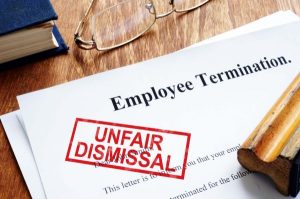Employment
Unfair dismissal – Childcare responsibilities were not a valid reason for failing to comply with Fair Work Commission directions
Mr Praveen Samuel lodged an unfair dismissal application with the Fair Work Commission (the Commission). He failed to respond to correspondence from the Commission by the deadline imposed and his application was dismissed. He sought leave to appeal the decision. The appeal was dismissed on the grounds that there would be no public interest in …
Read more
Unfair dismissal – Can unauthorised annual leave reduce the minimum employment period?
Mr Calleja was employed as a full-time spring maker until his employment was terminated by his employer in March 2021. Mr Calleja subsequently made an unfair dismissal claim. The former employer raised multiple defences to Mr Calleja’s claim, one of which was that Mr Calleja had not been employed for long enough to make an …
Read more
How certain are the terms of your employment contracts?
In the recent case of McAlister v Yara Australia Pty Ltd [2021] FCCA 1409, an employer was ordered by the Federal Circuit Court to pay damages of approximately $143,000 plus statutory entitlements (less any amounts already paid) for wrongful termination representing 9-months pay in lieu of notice to an employee. This may have been avoided …
Read more
Respect @ Work Reforms – Stop Sexual Harassment Orders
With the recent passing of the Sex Discrimination and Fair Work (Respect at Work) Amendment Act 2021 (Cth), applications can be made from 11 November 2021 to the Fair Work Commission for a Stop Sexual Harassment Order if an employee reasonably believes that they have been sexually harassed at work.
Qantas JobKeeper case – How to properly calculate JobKeeper payments
In a recent decision of Qantas Airways Limited v Flight Attendants’ Association of Australia (the JobKeeper Case) the Federal Court of Australia considered and determined the correct application of the JobKeeper provisions contained in section 789GDA(2)(b) of the Fair Work Act 2009. Relevant JobKeeper provision Section 789GDA(2)(b) contains the “minimum payment guarantee”, which operates to …
Read more
Genuine redundancies during the COVID-19 pandemic
In the recent case of Browne v MySharedServices Pty Ltd [2020] FWC 4445, the Fair Work Commission (Commission) has reasserted the importance of consultation, even during the current COVID-19 pandemic. In this case, Mr Matthew Browne (the Employee) was dismissed without his employer, MySharedServices Pty Ltd (the Employer), undertaking any consultation prior to his termination. …
Read more
How should you calculate sick leave?
In a recent case Mondelez Australia Pty Ltd v Automotive, Food, Metals, Engineering, Printing and Kindred Industries Union [2020] HCA 29 (Mondelez Case) the High Court settled some long-standing uncertainty about the meaning of “a day” under the Fair Work Act 2009 (Cth) (Fair Work Act). The National Employment Standards (NES), through the operation of …
Read more
Case Update: Employee compensated $200,000 after being dismissed for sharing a Hitler meme
We previously wrote about the decision of the Full Bench of the Fair Work Commission in the case of Scott Tracey v BP Refinery (Kwinana) Pty Ltd [2020] FWCFB 820. This case involved a Western Australia BP employee, Mr Tracey, who was dismissed with payment in lieu of notice after sharing a meme video of …
Read more
Introduction of Paid Pandemic Leave
In response to the COVID-19 pandemic the Fair Work Commission (Commission) introduced unpaid pandemic leave into 99 Modern Awards, to protect workers required to self-isolate as a result of being exposed to, or being infected with, COVID-19. The Commission has now introduced paid pandemic leave in response to the second-wave of infections in Victoria. What …
Read more
Consultation requirement in the redundancy process
Prior consultation of employees is one of the requirements for a redundancy to be genuine under section 389 of the Fair Work Act 2009 (Cth) (Fair Work Act). This section requires, among other things, employers to comply with any consultation obligation found in a Modern Award or Enterprise Agreement. Who do employers need to consult? …
Read more









